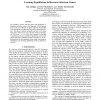Free Online Productivity Tools
i2Speak
i2Symbol
i2OCR
iTex2Img
iWeb2Print
iWeb2Shot
i2Type
iPdf2Split
iPdf2Merge
i2Bopomofo
i2Arabic
i2Style
i2Image
i2PDF
iLatex2Rtf
Sci2ools
129
click to vote
AAAI
2007
2007
Learning Equilibrium in Resource Selection Games
We consider a resource selection game with incomplete information about the resource-cost functions. All the players know is the set of players, an upper bound on the possible costs, and that the cost functions are positive and nondecreasing. The game is played repeatedly and after every stage each player observes her cost, and the actions of all players. For every > 0 we prove the existence of a learning -equilibrium, which is a profile of algorithms, one for each player such that a unilateral deviation of a player is, up to not beneficial for her regardless of the actual cost functions. Furthermore, the learning equilibrium yields an optimal social cost.
Related Content
| Added | 02 Oct 2010 |
| Updated | 02 Oct 2010 |
| Type | Conference |
| Year | 2007 |
| Where | AAAI |
| Authors | Itai Ashlagi, Dov Monderer, Moshe Tennenholtz |
Comments (0)

